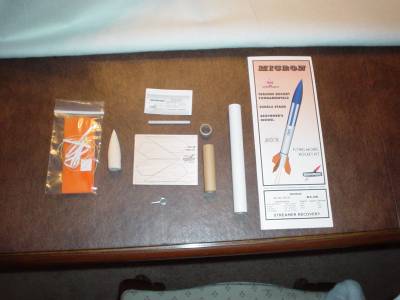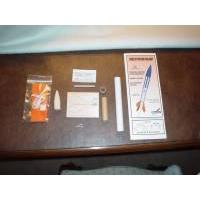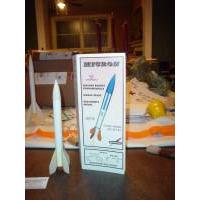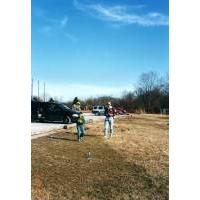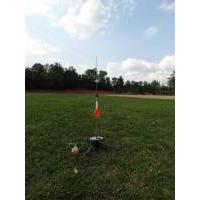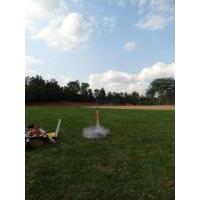| Construction Rating: | starstarstarstarstar |
| Flight Rating: | starstarstarstarstar |
| Overall Rating: | starstarstarstarstar |
| Published: | 2014-04-24 |
| Diameter: | 0.76 inches |
| Length: | 9.20 inches |
| Manufacturer: | Semroc  |
| Skill Level: | 1 |
| Style: | Sport |
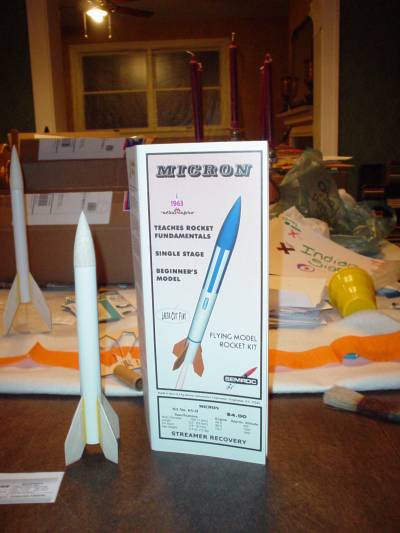 Brief
Brief
The Semroc Micron was part of my first order from Semroc back in 2003. I built it and the Skyhook side by side, and because of these two became enamored with the Semroc way. The sleek Skyhook and the sturdy Micron combined the best that was available in the hobby at the time, reproductions of classic kits with updated recovery systems and laser cut fins. Rocketry Nirvana, and I inhaled deeply.
Components
- ST-7 body tube
- Balsa nose cone
- Laser cut fin sheet
- Screw eye
- Thrust ring
- Kevlar and elastic shock cords
- Crepe paper streamer
Construction
Nothing here to challenge anyone but the most absolute beginner. In 2003 this may have been the perfect rocket for build and fly programs. For $4 you wound up with a stocky, sturdy little bird that could overfly the smallest of fields and survive. Even at the 2014 price of $8.50 this was a steal. Construction was a one evening project. The Kevlar was tied around the engine block, the engine block, fins, screw eye and launch lug were glued in place, and this was ready to fly. Simplicity. Sometimes it's all that you need.
Finishing
Finishing was the standard 4fnc exercise of primer, Elmer's Fill & Finish, and sanding. I occasionally get lazy during this process and get to a "good enough" point, but on the Micron I put in the effort to make it look great. After the sanding was done I shot the rocket with a coat of Valspar gloss white and tried to decide where to go from there. My first instinct was to go with a free-form red, white & blue variant. The "red" was handled by a dark burgundy metallic on the fin can, while the blue was an electric blue metallic on the nose cone and upper body tube.
I hated it.
Nonetheless I flew it this way for one flight until inspiration struck in the form of an Excelsior decal sheet. I sanded the offending metallics off, reprimed and resprayed the gloss white. This was followed by a fluorescent orange fin can and gloss black nose cone, then a BT-20 roll pattern decal from the Excelsior sheet.
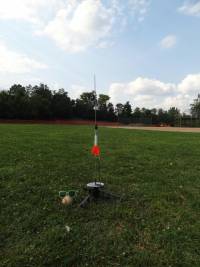

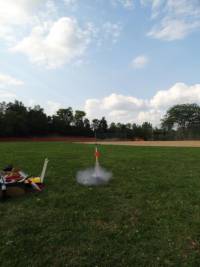
Flight
The first three flights of the Micron were of the 1/2A, A, B variety, although not in that order. I chose an A8-3 for the first flight, a slightly breezy day at Moescher Field, a small field that is no longer available for flying. The Micron did the typical straight up, straight down flight with a damage-free recovery in the grass. All of us who were there were surprised at the height, but the clear sky made for easy viewing for the whole flight. Not long after the flight we were informed that flight operations would no longer be possible on the field due to a change of ownership, so the Micron has the honor of the final flight at Moescher Field.
Second flight was on the big field at VOA Park with the QUARKers. The rocket had undergone a repaint that should have made it more visible in flight, so between that and the big space available, I felt safe in flying it on a B6-4 with an option to try a C6-5. Yeah, that C6-5 flight never happened. The Micron left the pad and disappeared. All the eyes on the flightline saw nothing, and continued to see nothing until the Micron suddenly materialized three feet off the ground directly in front of us. Based on the landing I'm guessing the flight was straight. Based on the seemingly endless wait before we saw it again, I'm guessing it was high. All I know for sure is that I got it back.
The third flight was on a brisk and breezy day at B6-4 Field. Gusty would be a more accurate description of the wind conditions, but we had launch fever and no wind was going to stop us unless it was sourced from a funnel cloud. Baseball was being practiced on the big field, so we set up on the smaller field. (Subsequently named 1/2A6-2 Field.) I didn't want much height for this flight, and at the time I had a pretty nice collection of 1/2A6-2 motors, so that was the choice. I could have thrown it as high as it went, but that was what I'd been hoping for. The rocket recovered by streamer in the outfield grass. Subsequent flights have all been at B6-4 Field on A8-3s and the Micron has become one of my favorite rockets on my home field. Depending on winds, the Micron generally hits somewhere between 400-500' and recovers via streamer fairly close to the pad. It's a keeper.
Summary
Pros: The 1963 fret buzz given off by this clone of the Centuri Micron. Ease of construction. Laser cut fins. Kevlar upgrade in recovery system. Performance. The fact that it existed.
Cons: Lack of decal despite one being pictured on the kit face card. (I'm nit-picking here because I hate leaving this space blank.) Semroc may be no more.
Other Reviews
- Semroc Micron By Chan Stevens
Brief: Nice little minimum diameter rocket that zips off the pad in a hurry and at $4 retail, makes for a nice little kit for that Cub Scout or school group. This is also an appealing kit to the nostalgia buff that is based on the 1963 Centuri kit by the same name. Construction: As is the case with almost every Semroc kit, this one came in a professionally bagged package along ...
- Semroc Micron By Mike Mistele
Brief: This is a very basic 4FNC, minimum-diameter, streamer-recovery rocket suitable for beginners. It's part of Semroc's RetroRepro line and, specifically, the Micron was originally a Centuri model (#KA-5) first released in 1963. The RetroRepro line updates these old models with more current technology--in this case, the upgrades include laser-cut fins and a Kevlar shock-cord. ...
 |
 |
Flights
 |
 |
